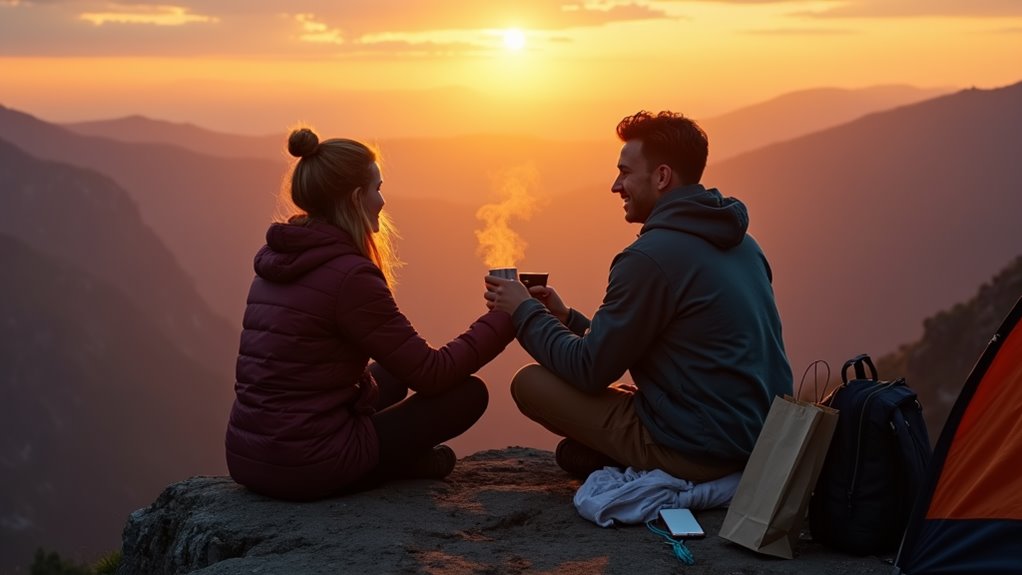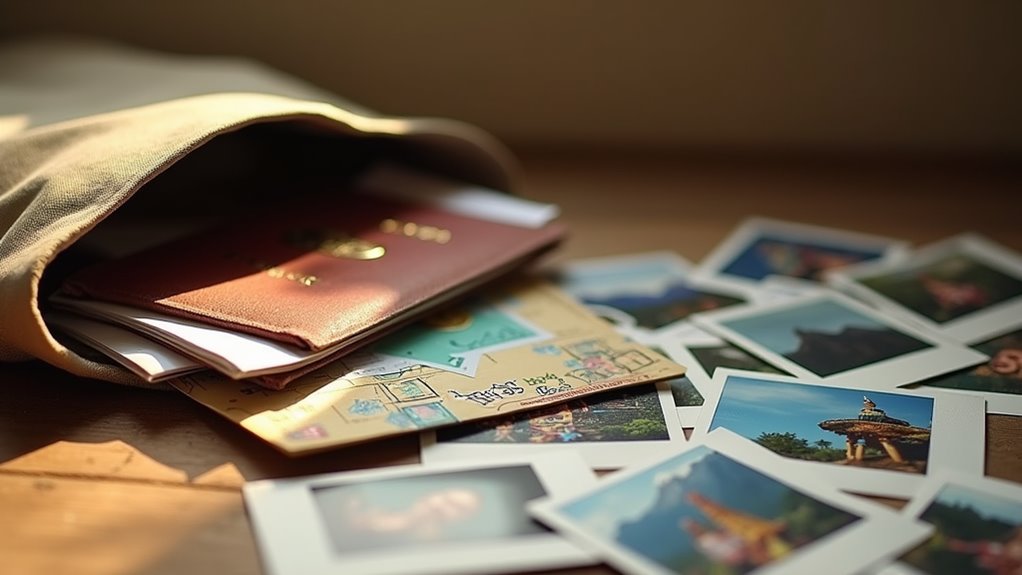You'll find greater happiness by investing in experiences rather than accumulating more stuff. Science shows that material purchases quickly lose their thrill through hedonic adaptation, while memories of experiences actually get better with time. When you spend money on activities, travel, and shared adventures, you're building lasting neural pathways for joy and creating stories that strengthen relationships. Your brain processes experiential purchases differently, activating areas linked to identity and self-reflection rather than just possession. By shifting your focus from buying things to collecting moments, you'll discover the true richness life has to offer.
Key Takeaways
- Brain research shows experiences create lasting happiness and meaningful memories, while material possessions quickly lose their appeal through hedonic adaptation.
- Investing in travel, activities, and shared adventures generates stories and connections that appreciate in value over time.
- Modern consumers are shifting from accumulating material goods to prioritizing life experiences that foster personal growth and learning.
- Shared experiences, especially through family adventures, build stronger relationships and create cherished traditions that last generations.
- Travel and new experiences reshape perspectives, challenge assumptions, and contribute to personal transformation more effectively than buying things.
The Science Behind Experiential Happiness

While most people instinctively chase material possessions for happiness, research shows that experiences create more lasting joy. When you buy a new car or phone, your brain's initial excitement quickly fades through a process called hedonic adaptation. You simply get used to having these things.
Experiences, however, become part of your identity and personal narrative. You'll find that sharing a concert, traveling to a new country, or learning a new skill activates different neural pathways than material purchases do.
These experiences trigger the release of dopamine and serotonin, but they also create meaningful memories and social connections. Brain scans reveal that experiential purchases activate areas associated with identity and self-reflection, while material purchases primarily stimulate areas linked to possession and value assessment.
Money Well Spent
Understanding the science of experiential happiness leads to smarter spending choices. When you allocate your money toward experiences rather than material goods, you're investing in memories that appreciate over time.
You'll find that spending on activities, travel, or learning opportunities delivers better value and longer-lasting satisfaction. Your money goes further when you prioritize experiences that align with your personal values and interests.
Whether it's taking a cooking class, planning a weekend getaway, or attending a concert, these investments create stories you'll share for years. Even simple experiences like trying a new hiking trail or joining a local workshop can yield significant returns in well-being.
Creating Meaningful Memories

Your most cherished memories often come from shared family adventures, whether it's a weekend camping trip or an overseas vacation that changes your perspective on life.
You'll find that investing in experiences creates deeper connections and lasting impressions than any material possession could provide.
Even small daily activities, like cooking together or taking evening walks, can build a treasury of meaningful moments that you'll value for years to come.
Family Adventures Matter Most
When families invest in shared adventures instead of material possessions, they create lasting bonds that transcend generations.
Whether you're planning a weekend camping trip or exploring a new city together, these experiences shape your family's unique story and strengthen your connections.
You'll find that children remember the excitement of catching their first fish or hiking to a mountain summit far longer than they'll recall last year's trending toys.
These shared challenges and triumphs become reference points for family conversations, inside jokes, and cherished traditions.
They also teach valuable life skills like problem-solving, adaptability, and teamwork.
Life-Changing Travel Moments
Travel experiences can fundamentally reshape your perspective and create profound personal transformations. When you immerse yourself in unfamiliar cultures, you'll discover new ways of thinking and living that challenge your assumptions.
You might find yourself connecting with locals in a remote village or standing awestruck before ancient architecture that's survived centuries. These moments become turning points in your life story.
Whether you're tasting exotic dishes in a bustling night market, learning traditional crafts from indigenous artisans, or witnessing breathtaking natural wonders, each experience adds depth to your understanding of the world.
You'll develop empathy, adaptability, and resilience as you navigate different customs and overcome language barriers. These skills and insights will stay with you long after you've returned home, influencing your choices and worldview.
Small Daily Memory Making
Creating meaningful memories doesn't require grand adventures or expensive trips abroad. You can build lasting experiences through simple daily activities that bring joy and connection.
Try cooking a new recipe with your family, taking evening walks in your neighborhood, or starting a small garden in your backyard.
You'll find precious moments in impromptu picnics at local parks, weekend board game tournaments, or teaching your child a skill you've mastered.
Make ordinary routines special by adding personal touches – turn your morning coffee ritual into a mindful practice, or transform your commute into an audiobook adventure.
Document these moments through photos or journaling to preserve their significance.
These small daily experiences add up to create a rich tapestry of memories that define your life's story.
Beyond Material Consumption
Modern society's obsession with material goods often blinds us to life's deeper rewards.
You'll find true fulfillment when you shift your focus from accumulating things to collecting meaningful experiences that shape your perspective and enrich your soul.
Start by evaluating your spending habits.
Instead of buying the latest gadget or fashion trend, invest in activities that expand your horizons.
Take that cooking class you've been curious about, plan a weekend hiking trip, or attend a live performance.
You'll discover that experiences create lasting memories and personal growth that no physical item can match.
Digital Minimalism Movement

As our lives become increasingly intertwined with technology, the digital minimalism movement offers a purposeful way to reclaim control over our screen time and online habits.
You'll find that this approach isn't about completely eliminating digital tools, but rather using them intentionally and meaningfully.
Start by evaluating which apps and platforms truly add value to your life. You can begin with a digital declutter: remove unnecessary apps, unsubscribe from distracting email lists, and limit social media usage.
Set specific times for checking emails and messages instead of responding to every notification.
You'll notice that digital minimalism aligns perfectly with choosing experiences over things.
Building A Rich Life Story
While material possessions come and go, the stories you collect through life's adventures become an integral part of who you are. Each experience adds a unique chapter to your life story, creating memories that shape your perspective and character.
You'll find that investing in experiences yields richer rewards than accumulating things. Whether you're hiking through remote mountains, learning a new language in a foreign country, or mastering a challenging skill, these moments become the building blocks of your personal narrative.
They'll give you conversation starters, wisdom to share, and lessons that stay with you forever.
Start documenting your experiences through photos, journals, or blogs. You're not just creating memories; you're crafting a legacy of adventure, growth, and meaningful connections that will inspire others and remind you of life's incredible journey.
Frequently Asked Questions
How Do I Convince My Family to Value Experiences Over Material Gifts?
Start with small steps by suggesting joint activities instead of exchanging gifts.
Share your own meaningful experiences and how they've impacted you.
Create a family bucket list of adventures you'd like to try together.
Offer specific ideas like cooking classes, day trips, or outdoor activities.
You'll find it easier to shift their mindset when they see how shared experiences strengthen family bonds.
What Age Should Children Start Learning About Experiential-Based Happiness?
Like a tiny seed that sprouts into a magnificent tree, your child's understanding of joy can begin as early as age three.
You'll notice they're naturally drawn to experiences – splashing in puddles, chasing butterflies, or building sandcastles.
Don't wait for them to grow up; start nurturing this innate wisdom now.
Through simple daily activities, you can help them connect happiness with doing rather than having.
Can Experiences Become Addictive and Lead to Financial Problems?
You can become addicted to experiences just like anything else.
When you're constantly chasing the next thrill or adventure, you might spend beyond your means to maintain that lifestyle. It's similar to shopping addiction, but instead of buying things, you're purchasing experiences.
You'll need to set firm budgets and recognize when your pursuit of experiences becomes compulsive rather than enriching.
How Do Introverts Benefit From Experiential Living Without Feeling Overwhelmed?
You've got a million ways to enjoy experiential living as an introvert!
Start by choosing solo adventures that match your energy levels – like peaceful nature walks, private cooking classes, or quiet museum visits during off-peak hours.
You can also plan shorter duration experiences, take breaks between activities, and create meaningful moments at home through meditation, art projects, or learning new skills online.
It's all about finding your personal comfort zone.
Are There Cultural Differences in How Experiences Are Valued Versus Material Possessions?
You'll find significant cultural variations in how people value experiences versus possessions.
In collectivist societies like Japan and Korea, shared experiences often hold greater importance than individual acquisitions.
Meanwhile, in Western cultures, you're more likely to see a mix, where personal achievements and material goods traditionally carry weight.
Yet many Nordic countries emphasize quality experiences, particularly those involving nature and work-life balance.
Conclusion
You'll discover that trading your need for material possessions into collecting moments can transform your life in a million different ways. By embracing experiences over things, you're not just changing your spending habits – you're redesigning your entire approach to happiness. When you look back on your journey, you won't count the items in your closet, but rather the adventures that have shaped your soul.

Leave a Reply